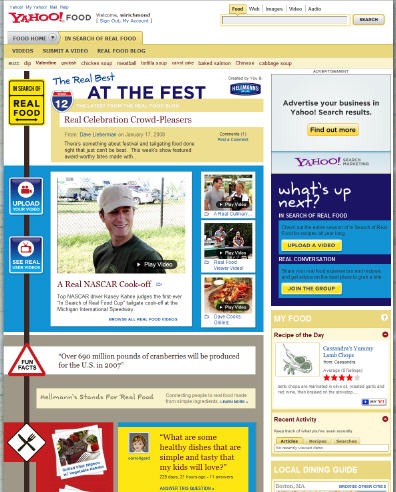-
Branded Entertainment is Upon Us
If you had any doubts that brand marketing and entertainment programming are converging, an hour spent
 listening to a presentation at the NATPE conference yesterday by Shelly Lazarus, Chairman and CEO of Oglivy & Mather Worldwide would have quashed them in a hurry.
listening to a presentation at the NATPE conference yesterday by Shelly Lazarus, Chairman and CEO of Oglivy & Mather Worldwide would have quashed them in a hurry. This new reality is a direct result of the audience-fractured, advertising-averse world in which we now live. Ms. Lazarus believes that for agencies, "the challenge as stewards of brands is to help them tell a better story." In fact, telling a better story (the traditional agency imperative, I would argue) is no longer sufficient, as Ms. Lazarus continued: "Now brands need to be a part of the content story."
As such, she envisions far tighter links between ad agencies and the Hollywood creative community. Drawing a meaningful distinction about these industries' respective roles, she explained to the audience of content types: "We need all of you desperately...we can come up with a brand idea, but we can't do programming."

She emphasized repeatedly that to optimize the branded entertainment relationship, agencies and the advertisers they represent should not be called upon to "write a check" when production is virtually wrapped up. Rather, they should be brought in as early in the creative process as possible, and be provided an opportunity to help shape the story narrative and become a vital part of it.
Even while recognizing the role that brands have played since the early TV days of sponsored "soap operas", this proposed tight intertwining of advertising and programming will no doubt strike creative purists as heretical, while sending consumer protection advocates to DEFCON 5.
Regardless, the branded entertainment initiatives Oglivy is now encouraging its clients to selectively pursue reflects nothing more than the hard realities of today's complex and brutally competitive marketplace. Empowered by ever-stronger technologies - broadband chief among them - consumers are getting choosier in their media consumption habits, with advertisers and their messages getting the short end of the stick. With technology increasingly defining young people's lifestyles, this is a trend that will only intensify.
Faced with this daunting prospect, leaders in the agency world like Ms. Lazarus have astutely recognized that by carefully placing their clients' brands within the story line itself, they are creating a much-needed firewall, not to mention a breakthrough new consumer engagement opportunity. To be sure, branded entertainment is not a willy-nilly pursuit, at least not at Oglivy. The agency has set up a unit solely to create, execute and manage these opportunities. Listening to Ms. Lazarus, it was apparent that for all her enthusiasm for branded entertainment, she knows it's neither universally appropriate for all brands nor a catch-all cure to all that ails the industry.
Branded entertainment and broadband video are a perfect match in many respects. Broadband video's nascent development, combined with its still unclear monetization mechanisms and flexible/interactive capabilities make it fertile ground for agencies such as Oglivy to experiment.
So where specifically does all this lead? Three things I would bet on: more product-centric viral video initiatives like Dove's Evolution (presenting an opportunity for Dove - an Oglivy client - to "have a point of view about beauty," as Ms. Lazarus put it), more product sponsored and conceived programming (e.g. Hellmann's "In Search of Real Food" on Yahoo; Hellman's is another Oglivy client) and more user-generated video contests around products (e.g. Frito-Lay, Heinz, etc.).

Broadband video is flowering just as traditional advertising and entertainment forms are under increasing duress. As such, it will be an enormous sandbox for agencies, brands, content creators and their audiences to all play in.
Categories: Brand Marketing, Indie Video, Strategy, UGC
Topics: Oglivy

